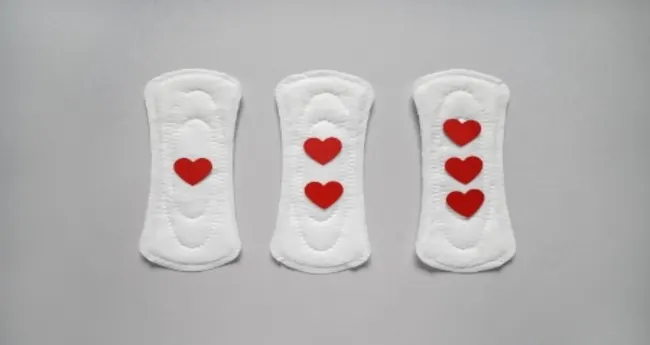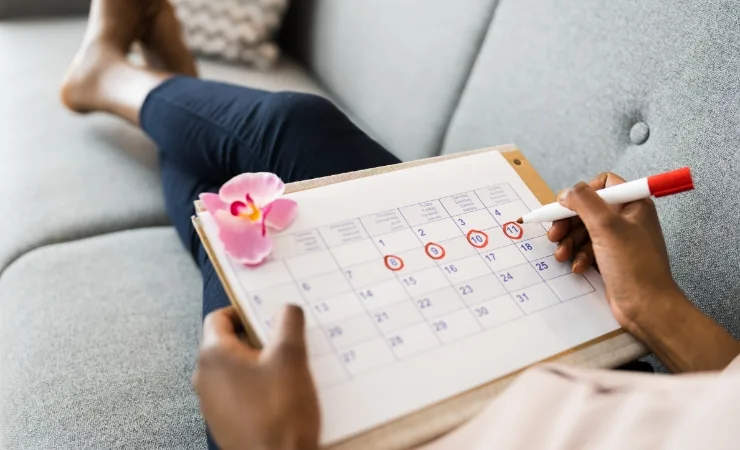Can You Get Pregnant Before Your Period? Understanding the Chances

“Can I get pregnant before my period?”, “Can I get pregnant a week or 2 days before my period?” - If these questions have been on your mind, you're not alone! Many people wonder about the chances of pregnancy right before their period, whether they're trying to conceive or aiming to avoid pregnancy without birth control.
Understanding how your menstrual cycle works is key to answering this question. In this blog, we’ll break down the science behind fertility and ovulation to help you determine whether pregnancy is possible in the days leading up to your period. Keep reading to find out more!
When Can One Get Pregnant?
It’s all about the timing! A woman is likely to get pregnant in the middle of her menstrual cycle. This is one of the phases of your menstrual cycle called ovulation. By and large, ovulation lasts anywhere between 12 to 48 hours. During this time, your ovaries release a mature egg which travels down the fallopian tube for fertilisation. If you have intercourse four days before your ovulation or a day later can result in pregnancy. This is known as your fertile window which differs from month to month based on your cycle.
All of which makes it tricky to evaluate when a woman is in her fertile period. However, it's always best to stay prepared for your ovulation. One tends to experience more vaginal discharge during ovulation, so using pantyliners is the best option. Try out the ALWAYS Extra Protect Pantyliners. These liners have odour neutralising technology that offers up to 100% odour protection to keep you feeling fresh and confident. It comes with an extra length which provides extra coverage. Lastly, they are dermatologically tested to be gentle on your skin.

Can You Get Pregnant Before Your Period?
If you are wondering, “Can I get pregnant 5 or 2 days before my period?” The short answer is - quite unlikely. It’s because ovulation takes place in the middle of your menstrual cycle. If you have a regular cycle which is 28 days long, you will ovulate on day 14 or day 15 of your cycle. This ovulation window closes a week and a half before your period begins. So, the possibility of getting pregnant before your periods a day or a week before is relatively less. It’s only in rare cases, you would hear someone say, “I got pregnant 1 day before my period,” as miracles do happen and one cannot reject the possibility entirely.
Can You Get Pregnant on the First Day of Your Period?
It’s a common belief that getting pregnant during your period is impossible, but the reality is a bit more complex. While the chances of conception on the first day of your period are generally low, it’s not entirely impossible. Sperm can live inside the female reproductive tract for up to five days. If you have a shorter cycle and ovulate early, sperm from period sex could still be present when ovulation occurs, increasing the chances of pregnancy.
Also, sometimes, what seems like the first day of your period could actually be spotting due to ovulation or implantation. If you mistake this for a period and have unprotected sex, you may be at risk of pregnancy. While the odds of getting pregnant on the first day of your period are low, it’s always best to use contraception if you’re not planning to conceive. Understanding your cycle and tracking ovulation can help you make informed decisions about your reproductive health.
Can You Get Pregnant a Week Before Your Period?
If you're wondering, "Can you get pregnant a week before my period?", the answer depends on your menstrual cycle length and ovulation timing. In most cases, the chances of pregnancy are lower but not completely zero. Here's why:
Ovulation Timing Matters – Pregnancy is most likely to occur during ovulation, which usually happens around the middle of a regular 28-day cycle (around day 14). If you have a longer cycle (e.g., 35 days), ovulation may occur later, meaning sperm from sex a week before your period could still fertilize an egg.
Sperm Lifespan – Sperm can survive in the reproductive tract for up to five days. If ovulation happens slightly later than usual, sperm from intercourse a week before your expected period could still lead to pregnancy.
Hormonal Variations – Stress, illness, or lifestyle changes can sometimes shift ovulation, making it unpredictable and increasing the chances of conception at unexpected times in your cycle.
Can I Get Pregnant Before My Period In A Shorter/Longer Cycle?
Not all women have the 28-day menstrual cycle. A few women experience a longer cycle which lasts for 35 days while others can go through a short one of 21 days. This change can cause your ovulation dates to fluctuate. All of which might make it difficult for you to predict your fertile dates. Additionally, other factors like stress, smoking, sleep cycle, obesity, diet, polycystic ovary syndrome (PCOS) or amenorrhea also affect your ovulation.
Shorter cycle
In this case, you won’t have much time between your periods and when you ovulate next. For instance, if you have intercourse during your periods and ovulate the following cycle’s egg in the next two to three days, your eggs might get fertilised. Given that sperm stays in the reproductive tract for a few days, there’s a chance of getting pregnant before your next period.
Longer cycle
As your body is taking some time to bleed, your ovulation would begin. This means your next month’s egg would ovulate while you bleed from the previous month. However, it is unlikely that you would get a positive pregnancy test in this situation.

If you are still wondering, “Can I get pregnant 2 days before my period in an irregular cycle?” then the chances are quite slim. To be extra sure, here are a few ways to know when you are ovulating:
- Tracking your basal body temperature
It’s your body temperature when it’s at rest. After ovulation this temperature rises which is a result of your body releasing progesterone. - Checking for cervical mucus
During ovulation your vaginal discharge would appear wet, stretchy and egg-white-like texture. This is cervical mucus which is a fluid released by your cervix during your fertile days.

- Using ovulation calendar
Ovulation calendar essentially help you track your periods and the days when you are likely to ovulate. - Opting for ovulation kits
At-home ovulation kits can help you know your fertile days. It detects the luteinizing hormone (LH), which increases during ovulation.
When To Take A Pregnancy Test?
The best time to take a pregnancy test is one day after you miss your periods. If you have an irregular cycle, try taking the test one or two weeks after having intercourse. To get more accurate results, it is recommended that you visit a doctor.
Curious about the signs ovulation is over? Our guide offers clear insights to help you understand your cycle better.
Takeaway
All-in-all, pregnancy depends on three major factors - The day you ovulate, when you have intercourse and the length of your menstrual cycle. If you are someone who is trying to conceive, taking medical advice is the best option. Tracking your ovulation window is another smart way to deal with the situation. Similarly, if you aren’t planning on getting pregnant, you should speak to your doctor and get the right birth control options.
FAQs
1. Can you get pregnant a week before your period?
Chances are really low for you to get pregnant a week before your period. It’s because your ovulation, i.e., your fertile window would close a week or more before your period begins.2. How likely is it to get pregnant the day before your period?
It is highly unlikely to get pregnant a day before your period. It’s because on an average in a regular menstrual cycle, a woman ovulates 14 days before her periods. It’s a narrow fertile window of six days. However, to be extra sure, taking medical advice is the best option.3. Can you get pregnant 5 days before your period?
It is possible to get pregnant 5 days before your periods, however, it's quite unlikely. Typically, a woman can get pregnant in the 6-day fertile window that occurs in the middle of her menstrual cycle. This window closes a week or more before your periods.Disclaimer:
Please note the date of the last review or update on all articles. No content on this site, regardless of date, should ever be used as a substitute for direct medical advice, diagnosis or treatment from your doctor or other qualified clinician. Always is committed to ensuring that all of our products meet rigorous safety standards; Always pads prioritize safety, protection and comfort of its consumers.




